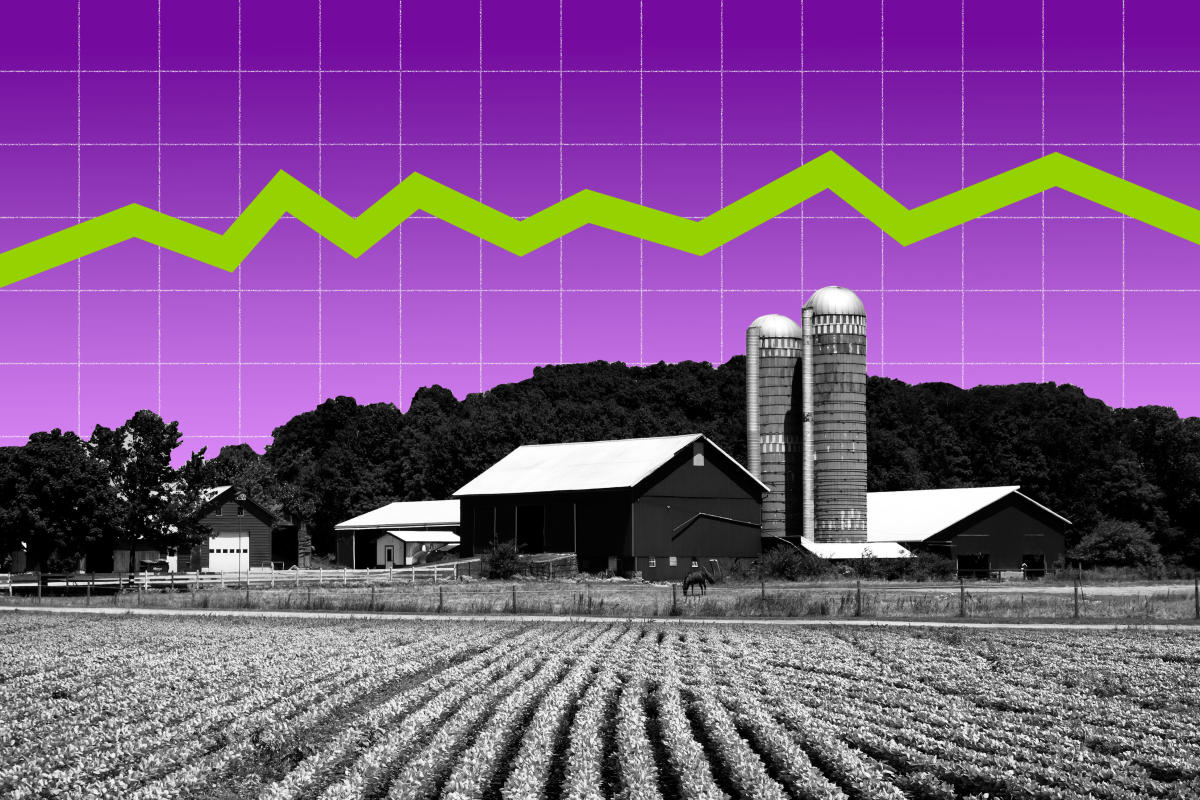Personal Finance
Worried About Inflation and Volatility? This ‘Very Niche’ Investment Could Be Right for You

***Money is not a client of any investment adviser featured on this page. The information provided on this page is for educational purposes only and is not intended as investment advice. Money does not offer advisory services.***
One of the most compelling investments during volatile times is as old as dirt. In fact, it is dirt — or rather, farmland.
“It’s hard ground…that you effectively own title to,” says Carter Malloy, CEO and founder of AcreTrader, an online farmland investing platform, “and it’s pretty simple.”
As stocks continue to struggle and inflation remains high, experts say that investing in farmland can be a good way to hedge against rising prices and diversify your portfolio.
Generally, investments in agricultural land provide several sources of income to investors. There’s income through rents from farmers as well as revenue coming off the farm. Investors also earn money as the land they own appreciates over the long term. Those factors aren’t likely to change any time soon: The need for agricultural products is only growing as the world’s population grows, and the value of land is rising. Not to mention the fact that new, sustainable farming techniques are rising in popularity, too.
“It’s always a good time to invest in farmland,” says Martin Davies, global head of Nuveen Natural Capital. “It’s an asset class which is not correlated to the economic cycle because it’s producing the necessities of life.”
DST Farmland is one of the leading providers of land brokerage services
Learn how you can use a 1031 exchange to invest in American farmland. All it takes is one click on your state.
Get Started
Farmland offers low volatility and reliable returns
While stock values can fluctuate wildly — something that investors saw firsthand in 2022 as the bear market wore on — farmland generally does not.
“You almost never hear of anybody that says, ‘I doubled my money in farmland last year’,” Malloy says. “You also almost never hear of anybody say, ‘I lost all my money in farmland last year.’”
Altogether, investments in American farmland have returned about 11% per year, on average, for the last four decades. That’s comparable with the long-term returns of the stock market, but while stocks bounce around, “farmland has this slow, consistent march up and to the right,” Malloy says.
The standard deviation of the average annual return of U.S. farmland between 1970 and 2019 is 6.4%, according to data from Nuveen, compared to 16.5% for the S&P 500 Index and 24.5% for the tech-heavy Nasdaq Composite. A smaller standard deviation means smaller, fewer price swings.
While no investment is ever guaranteed, the steady returns associated with farmland are part of what makes it such a powerful portfolio diversifier. There’s a good chance that even if your other investments are down, your agricultural investments are still performing well.
Analysts from Nuveen recently pointed out that farmers were relatively profitable during both the 2008 financial crisis and the COVID-19 pandemic, for instance.
Investing in farmland as an inflation hedge
There’s one more big reason that farmland is an especially compelling investment right now: inflation.
Unlike mainstream financial assets, which tend to lose value when consumer prices go up, the value of farmland actually tends to rise when prices rise.
The reason is simple: When crop (and grocery) prices rise, farmers make more money and so do investors who own the farmland.
“The price of corn, and the price of beans, and the price of cotton, and rice and many other things that we grow, has gone up a lot alongside inflation,” Malloy says. “That produces the revenue on the farm…that tends to correlate with the land value.”
The NCREIF Farmland Property Index, which tracks the value of farmland owned by investors, rose 10.2% in 2022 — that’s even more than the rate of inflation, which hit a four-decade high of 9% in June. The S&P 500, on the other hand, lost about 20% of its value over the course of the year.
Malloy also points out that farmland investments are less vulnerable to rising interest rates, which tend to accompany high inflation and which also eat away at returns on other types of assets. That’s because farmers tend to carry less debt than producers in other industries.
Drawbacks of investing in farmland
Farmland is not a mainstream investment, and the process of buying in is different and more complicated than trading stocks or bonds. “It’s very niche,” Davies says, “and it’s still a nascent asset class.”
It’s critical to do your homework to make sure you understand the ins and outs of the industry before investing. First, it’s likely that you’ll need to invest a larger chunk of cash up front. On AcreTrader, Malloy estimates that most people invest between $10,000 and $20,000 at the beginning. Investments in farmland are also significantly less liquid than investments in stocks, meaning that it’s much more difficult to pull your money out on short notice if you find yourself in need of cash.
Finally, be aware that putting money into any asset comes with risks, and investments in farmland carry some special ones, including those related to climate change and swings in commodity prices.
More from Money:
How Inflation Should (and Shouldn’t) Change Your Investing Strategy
Inflation Watch: 5 Ways to Protect Your Investment Portfolio From Rising Prices
4 Best Long-Term Investments
© Copyright 2023 Money Group, LLC. All Rights Reserved.
This article originally appeared on Money.com and may contain affiliate links for which Money receives compensation. Opinions expressed in this article are the author’s alone, not those of a third-party entity, and have not been reviewed, approved, or otherwise endorsed. Offers may be subject to change without notice. For more information, read Money’s full disclaimer.
Read the full article here

-

 Side Hustles6 days ago
Side Hustles6 days agoWhy the Best CEOs Think Like Anthropologists
-

 Make Money7 days ago
Make Money7 days agoEarn More in 2025: Top 10 High-Yield Savings Accounts Revealed
-

 Side Hustles4 days ago
Side Hustles4 days agoThis User-Friendly H&R Block Software Package is Only $40, While Supplies Last
-

 Side Hustles7 days ago
Side Hustles7 days ago10 Roles That Are Surprisingly Well-Suited for Outsourcing
-

 Side Hustles7 days ago
Side Hustles7 days agoWhat to Do If TikTok is Banned — How to Protect Your Brand
-

 Passive Income7 days ago
Passive Income7 days agoHow Pets Can Promote Better Health and Well-Being in the Workplace
-

 Investing4 days ago
Investing4 days agoTikTok faces US ban deadline as users brace for fallout By Reuters
-

 Personal Finance7 days ago
Personal Finance7 days agoBiden cancels more student loans with one week left to his term


















